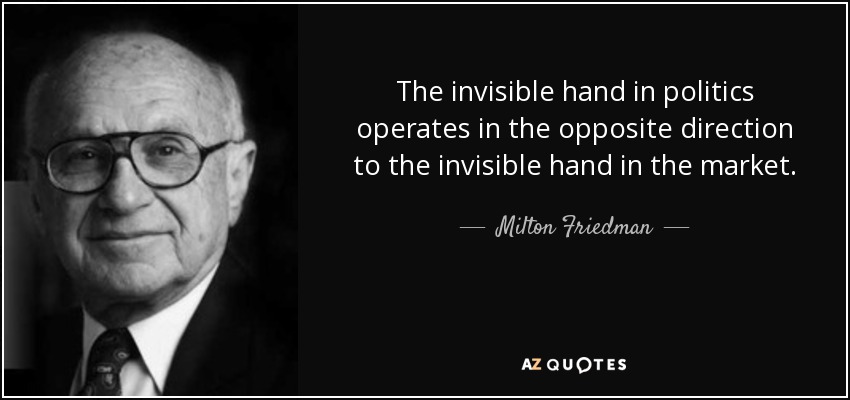
The invisible hand sees market economies as passenger planes, which, for all the miseries of air travel, are aerodynamically stable. Frank Hahn, a prominent Cambridge University theorist, sums up the matter: “We have no good reason to suppose that there are forces which lead the economy to equilibrium.”Īn engineering analogy may help. Seminal papers in the 1970s, one authored by Debreu, eliminated “any last forlorn hope,” as the MIT theorist Franklin Fisher says, of proving that markets would move an economy toward equilibrium. In 1960 Herbert Scarf of Yale showed that an Arrow-Debreu economy can cycle unstably. It is just a situation that might balance supply and demand if by happenstance it occurred. However, no one ever showed that some invisible hand would actually move markets toward that level. Making assumptions to characterize competitive markets, they proved that there exists some set of prices that would balance supply and demand for all goods. Finally, in 1954, Kenneth Arrow, at Stanford, and Gerard Debreu, at the Cowles Commission at Yale, developed the canonical “general-equilibrium” model, for which they later won the Nobel Prize. Leon Walras, of the University of Lausanne in Switzerland, thought he had succeeded in 1874 with his Elements of Pure Economics, but economists concluded that he had fallen far short. They hoped to show that market trading among individuals, pursuing self-interest, and firms, maximizing profit, would lead an economy to a stable and optimal equilibrium. In the 1870s, academic economists began seriously trying to build “general equilibrium” models to prove the existence of the invisible hand. Let “people of the same trade” meet, and their conversation turns to “some contrivance to raise prices.” Let market competition continue to drive the division of labor, and it produces workers as “stupid and ignorant as it is possible for a human creature to become.” Let banks charge much more than 5% interest, and they will lend to “prodigals and projectors,” precipitating bubbles and crashes. He mentioned it only once in the book, while he repeatedly noted situations where “natural liberty” does not work. What shocked me, when I later delved into economic theory, was to discover that, at least on this matter, theory supports practical evidence.Īdam Smith suggested the invisible hand in an otherwise obscure passage in his Inquiry Into the Nature and Causes of the Wealth of Nations in 1776. Having lived in Mexico in the wake of its 1994 crisis and studied its politics, I just saw the absence of any invisible hand as a practical fact. The financial crisis that erupted in 2008 and the debt crises threatening Europe are just the latest evidence.

Of course, the dynamic but turbulent history of capitalism belies any invisible hand. Most never even heard what the theorists said, or else resolutely ignored it. But the message never got through to their supposedly practical colleagues who so eagerly push advice about almost anything.

After more than a century trying to prove the opposite, economic theorists investigating the matter finally concluded in the 1970s that there is no reason to believe markets are led, as if by an invisible hand, to an optimal equilibrium - or any equilibrium at all. All prices are checked and compared in real-time.One of the best-kept secrets in economics is that there is no case for the invisible hand. InvisibleHand helps you to save money while shopping online by doing price comparison for you and automatically notifies you of the best prices and promo codes. InvisibleHand is also available for Firefox from: Smith didn't have Google Chrome to help prove his point, but we hope he would approve. This money saving extension gets its name from the 18th century economist Adam Smith's concept of the invisible hand of the market. It also works with the most popular airlines and travel sites in the UK & US and supports hundreds of airlines & thousands of hotels. InvisibleHand displays coupons for over 20,000 retailers in US, and UK. It will automatically find the lowest price when you search for travel online. InvisibleHand also supports hotels, rental-cars and flights.

"InvisibleHand Plug-in Points out Better Deals" - Gizmodoįeatured in The New York Times, Mashable, USA Today and more! "The Best Browser Extensions That Will Save You Money" - LifeHacker Make sure you're always getting the best deal. InvisibleHand also lets you know if there are coupon codes for the store you're shopping. InvisibleHand discreetly notifies you if the product you’re shopping for is available for less at another site. Automatically get the lowest price on whatever you’re buyingSave money with automatic price comparison and coupon codes.


 0 kommentar(er)
0 kommentar(er)
